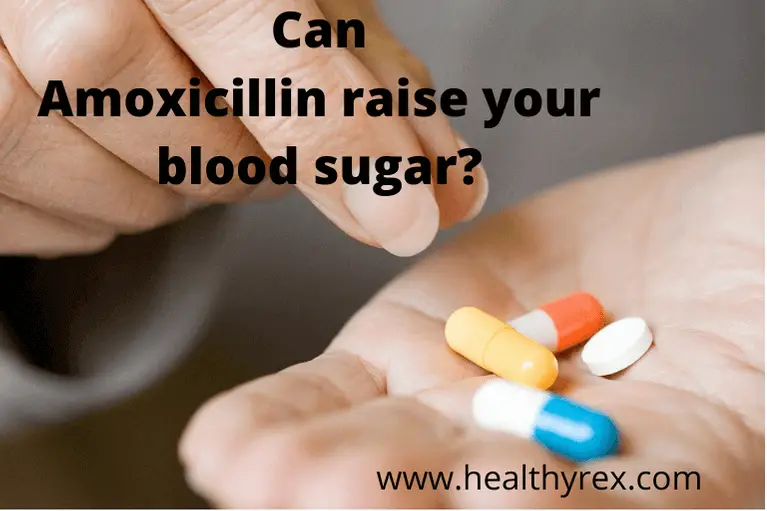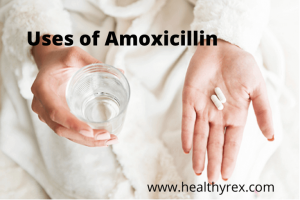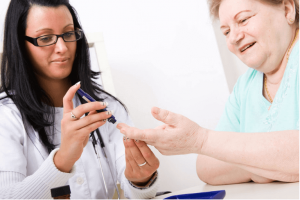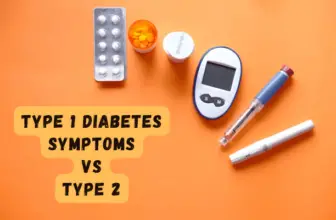Can Amoxicillin Raise Your Blood Sugar

In the present day world, high blood sugar (diabetes or hyperglycemia) is so common. It is often due to having a family history of diabetes (genetic factors), or it may be due to our unhealthy life habits (i.e., their sedentary lifestyle). Moreover, in the same modern world, another thing is also very common, guess what?? That’s antibiotics.
With the overuse of many antibiotics, many problems have also risen that include antibiotic resistance, many times allergies and side effects, and many more unpleasant consequences. People are now more concerned about medications rather than their health. Many questions arise in people’s minds: “is it fine to take antibiotics routinely in severe infections?” and “can Amoxicillin raise your blood sugar? (Which is the main focus of this article)?
These questions are sometimes confusing, and a layman is unable to answer such questions. So if you are experiencing any confusion and do not want to follow a myth by the general public blindly, then you should consult some expert or specialist physician.
Some facts related to antibiotics:
Amoxicillin is an antibiotic. Let me first tell you what antibiotics are and some interesting facts. Antibiotics are those medicines that fight bacterial infections. They may be bacteriostatic or bactericidal. Former one helps in reducing the growth of bacteria by preventing their reproduction while later one kills bacteria.
Antibiotic was first discovered by Sir Alexander Fleming in 1928, and its name is penicillin. The source of penicillin was a fungus Penicillium notatum. Now many antibiotics are related to penicillin, and Amoxicillin is one of them. However, it should be noted that antibiotics are only effective against bacterial infections and ineffective for virus-related infections.
These days “antibiotic resistance” is a common topic for discussion. This term refers to the ineffectiveness of many common antibiotics against many strains of bacteria. These bacteria are responsible for various common infections.
The actual cause of this ineffectiveness is the frequent and unnecessary use of antibiotics. Due to its everyday use, bacteria become resistant to these antibiotics either by genetic modifications or adaptations.
Amoxicillin and its uses:

As I have discussed Amoxicillin is a penicillin related antibiotic. It works by preventing infectious bacteria from making their cell walls. Its uses involve the treatment of many infections like urinary tract infections, different skin infections, and chest infections, etc.
You can use it with some other antibiotics. For example, some stomach ulcers caused by Helicobacter pylori can be treated by using both Amoxicillin and clarithromycin simultaneously. As it is an antibiotic, so it will not work for any viral infection.
Moreover, its excessive use will also make it less effective, or we can say bacteria will become resistant to it. Since it is not an over-the-counter drug, take proper instructions you’re your doctor before using it.
Furthermore, you should drink plenty of water while taking Amoxicillin (or any antibiotic) as it affects your kidneys. Before using Amoxicillin you should be quite sure that you are not allergic to this drug.
Some possible side effects:

Although chances of any side effects of Amoxicillin are minimum if you are using after a proper prescription from a doctor, some side effects persist. These include
- Vomiting
- Nausea
- Diarrhea
- Blistering, peeling, or loosening of the skin
- Heavier menstrual periods
- Abdominal or stomach cramps or tenderness
- Rash
- Headache
- Oral thrush (due to extensive use)
However, it is still under consideration whether the drug disturbs some metabolic processes or not. One thing should be noted here that all these side effects are other than high blood glucose levels.
Amoxicillin and high blood sugar:
Now let us see how Amoxicillin raises blood sugar. But first, we have to find either it has some scientific logic or just a myth. As well as Amoxicillin’s connection and high blood sugar are concerned, I must say it is a myth. It is not my personal opinion, but many scientists have proven this fact that elevated blood sugar is not due to the antibiotic, i.e., Amoxicillin. But it is the infection that causes high blood sugar levels. Let us discuss some common infections that need Amoxicillin.

Skin Infections:
Skin infections may be the result of staphylococcus and streptococcus bacteria. Antibiotics from the penicillin family are effective against these bacteria.
Pneumonia:
It is the inflammation of air sacs in one (single pneumonia) or both lungs (double pneumonia). It may be due to bacteria or some fungus. The use of antibiotics from the penicillin family is evident in the treatment of bacterial pneumonia.
Urinary Tract Infections:
Urinary tract infections can be the result of bacteria E.coli and Amoxicillin is helpful in its treatment.
Bronchitis:

It is the inflammation of bronchi. Bronchi are the tubes that originate from the division of the trachea. Their function is to transport air to and from lungs during inhalation and exhalation, respectively. Sometimes the disease is a viral infection. But if it is a bacterial infection, it only then can be cured by antibiotics.
The solution of mystery:
Many studies have been conducted to solve this mystery and why it is so. There are two main perspectives for this whole discussion.
- One is that infections are more frequent in diabetics.
- And other is that infections can even raise the blood sugar of non-diabetics.
Now, if we know the actual cause of high blood sugar levels associated with antibiotics, we will discuss these perspectives in more detail.
Exposure of people with diabetes to infections:
High blood sugar or hyperglycemia may be of many types and for many reasons. It may be due to some genetic factor, age factors of disturbance in some physiological process. Diabetic patients are more susceptible to many infections than non-diabetics.
Researchers working at the University of Surrey, UK, found that people with normal blood sugar levels have less chance of developing any infection. This research work was published in August 2006 in a journal named Diabetes Medicine. According to observation, there are samples of 34000 people with type II diabetes and 600,000 healthy people.
It was concluded that diabetic people experience more infections than normal ones. One possible cause of this can be that fungi and bacteria use blood glucose to fulfill their carbon requirements. So when sugar/glucose levels are high in the blood, then it is a golden chance for these bacteria and fungi to grow and cause possible infections.

How are infections associated with high blood sugar?
Infections excitingly elevate your blood sugar level. Now this includes some interference of hormones. When you have an infection, then your body releases certain hormones to overcome this disturbance. These hormones interfere with insulin, the hormone that controls your blood sugar. In your body pancreas produce insulin.
This hormone’s primary function is to remove glucose from your blood and make it available for tissues and muscles to use. This glucose in your blood comes from your carbohydrate meal. So if there is any disturbance with insulin means your blood sugar will be higher than normal levels, and you will be called a person with diabetes.
Thus this hormonal imbalance is associated with infections, and we can say that infections increase blood sugar. Many times high blood sugar is an indicator of some infection.
Effect of infections on blood sugar of non-diabetics:
Now let’s see from another perspective that infections increase the blood sugar of healthy or diabetic people. So it has been observed that the same hormonal imbalances occur in healthy people. Actually, during any stressful or abnormal condition, your body produces hormones like cortisol.
These hormones are secreted to help your body fight from such situations. But on the other hand, these hormones may increase your blood sugar. Here a question comes to mind: why does this happen? Actually, to fight off any infection or problem, your body needs energy. To accomplish this energy, these seducing hormones increase your blood sugar.
If you are familiar with basic biology concepts, then you can understand the link of energy with glucose very well. So here, the hypothesis of infections increasing blood sugar gets strengthened once again. But this story does not end here, but there are many twists in it.
Symptoms of high blood sugar:

If you have an infection, then your blood sugar can be high even if you are non-diabetic. So you should know about the possible symptoms of hyperglycemia. These symptoms are almost similar to those of diabetic ones. These include
- Dizziness
- Hunger
- Increase in thirst
- Lightheadedness
- Stomach pain
- Sweating
- Speaking difficulty etc
- Blurred vision
- Frequent urination
So if you are experiencing any of these symptoms after being infected, you should not ignore it. You should immediately consult your physician. Although hyperglycemia is not common in non-diabetics, it can be dangerous for them.
Hyperglycemia, if left untreated, can cause serious concerns. Untreated hyperglycemia can damage your nerves and blood vessels. It can also damage your significant organs and increase the chances of having a stroke or heart attack.
Sometimes you may feel difficulty breathing, and you ignore it as you think it is due to infection. But this ordinary symptom of hyperglycemia can be proved fatal. Another factor that increases the chances of hyperglycemia is obesity.
So if you are obese, your chances of non-diabetic hyperglycemia after infection will be higher than other people.
Buy Sugar Balance Supplement For as Low as $33/Bottle. Lowest Price Online. Huge Savings. Improve Your Metabolism and Regulate Healthy Sugar Levels. All Natural. No Side Effects. 180 Days Money-Back Guarantee.
Some antibiotics are observed to increase blood sugar:

A significant twist in this story is that apart from the drug of our consideration, i.e Amoxicillin, some antibiotics increase blood sugar. These mainly include fluoroquinolones that many studies have found to cause hyperglycemia, especially in diabetic patients.
Another drug Gatifloxacin was also found to disturb normal levels of blood sugar. So in 2006, this antibiotic became prohibited by the FDA( Food and Drug Authority) for diabetic patients. Even this medicine was banned in the UK. Again the mind needs logic that how antibiotics increase blood sugar means how it is possible.
In 2015 researchers found that some antibiotics can change the microbiome of the gut, disturbing glucose up taken by cells by changing their sensitivity. In this way, the glucose in the blood is increased, and here the real culprit is not other than the antibiotic. So especially diabetic people should take antibiotics with care and try to avoid them.
But to prevent antibiotics, they should also prevent infections so that there is no need for medicine. This discussion shows that there is some link between antibiotics and blood sugar levels.
Some other medications that influence blood sugar:
Medicines are taken to keep you healthy. But sometimes these medicines that cure one problem may become the cause of other issues associated with health. Antibiotics are not the only cause of high blood sugar among all drugs. Besides antibiotics, some other medications disturb the average blood glucose level. Let us go through them.
- Thiazide diuretics helpful in the treatment of hypertension
- Statins that are used to lower the high cholesterol levels
- Drugs that are helpful in the treatment of severe allergies
- Steroids like prednisone in the treatment of specific allergies
- Birth control pills
- Drugs after tissue transplant to avoid tissue rejection
- Antidepressant drugs helpful in the cure of mental health problems
So people with diabetes should take any medicine after proper consultation from a doctor. Over the counter, drugs can be dangerous for their health.
Summary:
From the whole above discussion about “can amoxicillin increase your blood sugar,” we can conclude that it is not Amoxicillin that raises your blood sugar, but it is the infection that does so. We have also seen how diabetes increases the chances of having an infection and how infections increase blood sugar.
We have also discussed the same problem of hyperglycemia in non-diabetics that possibly occurs after encountering an infection. But it is a general rule of thumb for all that you should take any medication, especially antibiotics, after the prescription of some doctor. And even if you experience some side effects, then immediately consult your doctor.
FAQ’s
-
Can medications increase your blood sugar?
Many can, including steroids, depression and anxiety medications, beta-blockers, statins, some asthma, and acne medications. Knowing the medications that can influence blood glucose levels is basic inappropriately thinking about your diabetes patients. A few drugs raise glucose in patients, while others may bring down their levels.
-
Will infection raise your glucose level?
The disease causes a pressure reaction in the body by expanding the measure of specific hormones, such as cortisol and adrenaline. These hormones neutralize the activity of insulin and, subsequently, the body’s creation of glucose builds, which brings about high glucose levels.
-
For what reason is my glucose high even with medications?
On the off chance that your glucose varies, for the time being, your primary care physician may need to modify your portion or timing or may propose that you attempt alternate medications. You may need to change your drug after a specific measure of time. Watch your eating routine. You may need to eat less.
Related Reading:






